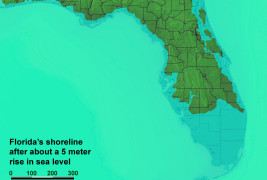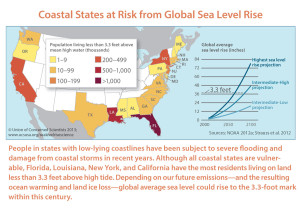Climate Change Condensed: Professor Chanton’s Message to Governor Scott
Feature
Ecology News Staff
A recent feature in Ecology Florida News reported on an offer from ten climate-change specialists to meet with Governor Rick Scott to explain to him the basics of climate change and the impact global warming is having and will have on the state of Florida.[1]
As noted in that feature, it is still not clear if the governor or only members of his staff will meet with the scientists. What is clear is that the scientists know what they are talking about and one, Jeffrey Chanton, can present the facts of climate change in a very clear straightforward language. He does so in “What I will tell the governor on climate,” published on August 8, in the Tampa Bay Times.[2]
Chanton is a good writer, and presents the reality of global warming in a way that nearly anyone with basic literacy skills can understand. He also specifies the looming catastrophes that await the state if nothing is done.
Chanton holds high academic rank. He is the John Winchester Professor of Oceanography and a Distinguished Research Professor at Florida State University. If you are expecting jargon and rhetoric only other scientists can understand, think again. Chanton will surprise you. After reading his short account, even non-scientists will easily understand what is happening and what is at stake. This is important, because Gov. Scott has reminded us repeatedly that he is not a scientist. Neither are most other people. It appears that Professor Chanton has taken Gov. Scott’s assertion to heart, and the rest of the non-scientists have benefited as well. “What I will tell the governor on climate” is easy to read, direct, cogent, and convincing.
Importantly, Chanton tells us (and presumably the governor), over the last 800,000 years (a period known as the Pleistocene), researchers have observed a direct correlation between fluctuations in temperature, carbon dioxide in the atmosphere, and sea level. During this entire period, carbon dioxide in the air ranged from “280 parts per million (ppm) in warm periods and 180 ppm in cold times.” He then observes: “Since the Industrial Revolution in the 1800s, human burning of fossil fuels has raised the carbon dioxide in the Earth’s atmosphere on a massive scale, to more than 400 ppm. This level is higher than it has been for more than 1 million years.”
So, a warm period, with higher temperatures, melting ice, and sea level rise is signaled by CO2 at 280 ppm. Today it is over 400 ppm. The implications seem clear – and they have been clear to many for decades – even to those of us who are not scientists. There is no need to restate them here, but if you are interested in further comment, see the earlier ECFL News feature, “400” on our passing of the 400 ppm milestone.[3]
Even if the governor does not meet with Professor Chanton, it will be beneficial if he reads Chanton’s essay. It is good news that the rest of us also have the opportunity read it as well. “What I will tell the governor” offers an excellent account of climate change for all the folks who are not scientists, which, after all, is just about everyone – including Governor Scott.
Sources and References
1. “The Governor and The Scientists,” Ecology Florida News, Feature
2.“What I will tell the governor on climate,” Jeffrey Chanton, Tampa Bay Times, Exclusive
3.“400,” Ecology Florida News, Feature



Leave a Reply